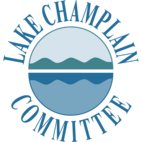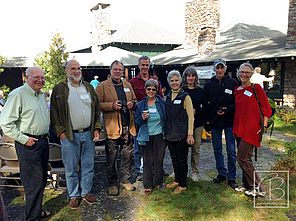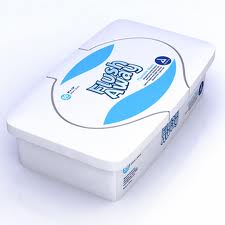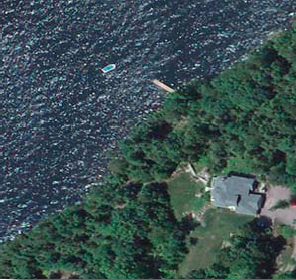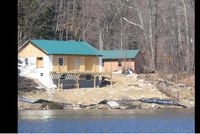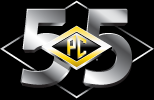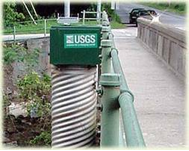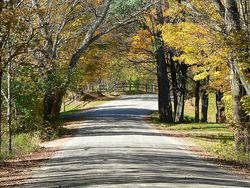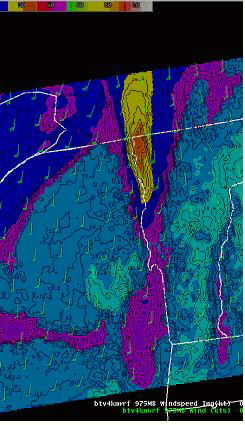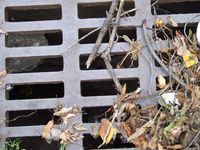LCC Autumn E-News: A Great Party, Dirty Roads, Click to Win, Low-level Jets, and More!
What a Great Party!
We had a wonderful 50th anniversary celebration at Flat Rock Camp in Willsboro earlier this month. The sun shone, conversation flowed, the food and drink were delicious, and a good time was had by all! LCC founding father Peter Paine reflected on the past and told some stories about LCC's seminal work preventing the international seaway and nuclear power plant as well as efforts to clean up toxic waste sites, develop the water quality standards that guide New York, Vermont and Quebec's phosphorus reduction efforts, and institute proactive measures to prevent pollution. Executive Director Lori Fisher looked ahead at the challenges facing the lake noting that citizen involvement is just as important now as it was during LCC's founding 50 years ago. Stormwater-runoff, nutrient loading, new generation toxins, invasive species and climate change are all present day challenges requiring civic engagement and activisim. We also honored LCC volunteer of the year Cliff Landesman for his outstanding work on the Legacy Campaign and gave Peter Paine a surprise award for his of fifty years of leadership.
If you missed the meeting, click here to see some pictures thanks to longtime LCC member Carolyn Bates. A professional photographer, Carolyn has been generously sharing her photographs with LCC for over 28 years. Sincere thanks to Peter and Patty Paine for hosting the party, Champlain National Bank for their sponsorship, and Ann Ruzow-Holland and friends, The Tyler Place Family Resort for making the delicious food. We're grateful for the support of Boyden Family Winery, Shelburne Vineyard, Otter Creek Brewing, and Switchback Brewing Company for their support and the generous donations of food from Alan and Jennie Booth, Cabot Creamery Cooperative, Chef's Corner, City Market, Full Moon Farm, Great Harvest Bread Company, Green Mountain Coffee Roasters, Hannaford Brothers, Lake Champlain Chocolates, New Moon Cafe, Shelburne Orchards, Stewart's Bakery, Sugarsnap, The Nomadic Oven, Vermont Brownie Company, Vermont Creamery, and Vermont Smoke and Cure. Read more about the party on LCC's website.
Flushable Wipes Aren't So Flushable
Flushable wipes, tampon applicators, and other personal care items often advertised as "disposable" can wreak havoc at wastewater treatment plants and cause sewage overflows. Read more about the problem and your role n prevention in this news story from WCAX TV or watch the newscast.
At Montpelier's wastewater plant, Bob Fischer takes a great interest in what you flush down the toilet. Fischer, who operates the city plant, says over the past few years he's seen it all.
"We find a lot of tampon applicators; we find shop rags," he said, "toothpicks, dental floss, small toys."
But what he says he's finding with increasing regularity is disposable wipes. Wastewater operators across the state and the country say it's a growing concern, especially with the booming growth of products claiming to be "flushable."
In wastewater parlance, they fit into a broad category called "non-dispersibles"-- basically everything besides your number 1 and 2s and the toilet paper you use. Fischer says this debris clogs up sewage lines and pump stations like a clogged artery in a heart. Read more on LCC's website.
New Study Shows Effects of Lakeshore Development
The Lake Champlain Basin Program (LCBP) has released a study examining the effects of lakeshore development on Lake Champlain's shoreline habitat. The study conducted by Fitzgerald Environmental Associates began in 2011 and examined 90 shoreline locations along Malletts Bay in Colchester, VT with the goal of quantifying and understanding the effects of lakeshore development on shallow, near-shore habitat in Lake Champlain. The study is timely given that Vermont is considering adopting shoreline regulations to protect shoreline habitat.
Using high-resolution aerial photography to create detailed maps of shoreline conditions and lakeshore land use, the contractors examined the relationships between these conditions and the biological communities near shore, primarily macroinvertebrates which help to form the base of the food web. The contractor found that as shoreline development increases, riparian vegetation decreases, resulting in decreased shading, habitat cover, and inputs of woody debris and organic matter to the littoral zone. The decrease reduces material available for macroinvertebrates and changes the dynamics of beach erosion, particularly in sandy sites. The study results were generally consistent with findings from studies of smaller inland lake studies in Vermont. Read more about this study on LCC's website.
October 3 - Shoreline Protection Meeting
The final fall meeting on shoreline protection will be held Thursday October 3 from 6:00 - 8:00 PM at Contois Auditorium in Burlington. Please attend and and speak out in favor of protecting our waterways!
Last winter the Legislature established a Lake Shoreland Protection Commission in anticipation of further legislative action in 2014. The Shoreland Commission and the Vermont Department of Environmental Conservation have been hosting meetings throughout the state to explain Vermont’s water quality programs and outline the need for greater lakeshore protection as one overdue measure in the state’s clean water strategy. The October 3 meeting is the last one this fall. The meeting format allows attendees to write their questions and comments on cards which are then responded to by the Commission. It's critical that lawmakers hear strong support for safeguarding our lakes at the meetings. Read on for why shoreland protections are needed.
Help LCC Win $5,500 - Vote Today!
PC Construction is celebrating its 55th anniversary year by giving $5,500 grants to five non-profit organizations. PC Construction employees chose the top ten contenders and now the public gets choose the winners. The Lake Champlain Committee (LCC) is in the running as a finalist but we need your help to win the funds for our water protection work! All voting must be completed by October 1 so please act now. Click here and cast your vote for the Lake Champlain Committee (we're the second to the last entry on the alphabetical list). You can vote separately from your computers and mobile devices.
Stream Gage Funding Secured – For Now
Funding appears to have been secured for the remaining Lake Champlain Basin stream gages that were threatened with closure. Thanks to all of you who made calls or wrote letters emphasizing the importance of our stream gages and the need for on-going, stable funding!
A variety of partners have stepped forward to fill the gap in the United States Geological Survey (USGS) budget. Vermont and New York Departments of Environmental Conservation have taken responsibility for most of the gages while the City of Montpelier will fund two gages on the Winooski River and the Champlain Water District will tentatively fund the LaPlatte River gage. On September 18 the Lake Champlain Basin Program Steering Committee authorized funding for one year for the five gages remaining on the chopping block, with a caveat that a long-term plan for funding be put together by partners in the near future. Stream gages are critical for flood-forecasting, pollution monitoring, and environmental evaluation. By chairing the Basin Program’s Technical Advisory Committee, LCC Staff Scientist Mike Winslow sits on the Steering Committee and was able to have a direct say in the resolution of the funding dilemma.
Lake Look: Dirt Roads
A dirt road meandering through the woods sets songwriters hearts aflutter. John Denver asked Country Roads to take him home. James Taylor went walking on a Country Road. Bob Dylan had the Dirt Road Blues. Country singer Jason Aldean got a Grammy nomination for his Dirt Road Anthem. Lucinda Williams won a Grammy for her Car Wheels on a Gravel Road. Being a predominately rural area, the Lake Champlain Basin has its share of unpaved roads. Collectively they have a distinct impact on our lake.
There are over 14,000 miles of roads in Vermont and 7,000 miles of roads in the five New York counties that are at least partially in the Lake Champlain Basin.
Roads have an ecological impact far greater than would be anticipated based on the amount of area they cover. They act as filters for animal movement; allowing only some individuals to cross. They provide conduits for seed dispersal for many invasive plants. They are direct sources of pollutants like salt, motor oil, and pesticides used to keep vegetation at bay. Read more about roads' impact on lake health on LCC's website.
Nature Note – Low-level Jets
Strong winds in the lower atmosphere often develop in late autumn along Lake Champlain. These events, called low-level jets, can occur when a high pressure system over the Atlantic Ocean creates southerly winds which become channelized and accelerated by the north-south orientation of the Champlain Valley. They can happen at any time of the year, but are most common between late summer and early winter when the difference in temperature between the water and the air above is greatest. The greater the difference in temperature between the warm lake water and cooler air above it, the greater the potential to mix stronger winds aloft down to the surface of the lake.
As ice begins to form, the temperature differential is dampened. Wind speeds during low-level jet events typically reach 25 to 40 miles per hour, strong enough for the Weather Service to issue wind advisories. Low-level jets are most likely to occur at night and tend to be pushed against the eastern wall of the Champlain Valley. For more information about this lake-influenced weather phenomenon check out the National Weather Services explanation in their October 2008 Champlain Weather Chronicle.
Fall Clean Lake Tip
Help keep our waters clean by sweeping or raking leaves away from roadways. Piles of autumn leaves can become part of the stormwater flow into the lake. Rake up any leaves you see collecting on sidewalks, driveways, and roadways near your house. Once they're off hard surface areas and on your lawn, mulch them them with a few passes of the lawnmower so the nutrients left in the leaves go back to your lawn instead of into the lake.
Like LCC on Facebook!
On Facebook? We are too! 'Like' LCC's Facebook page for engaging content, the latest lake news, and beautiful lake photos. Here's how to like the Lake Champlain Committee on Facebook:
- Click here for LCC's Facebook page
- Click the "Like" button
- If you aren't logged into your Facebook account, you may be prompted to log in
- Enjoy frequent lake updates and LCC news
Moving? Changing Email Addresses?
If you’ve changed your address recently, please send us an email so we can update your files and ensure you receive news on lake issues and LCC’s work. Email is our primary form of communication with members. Mailing electronically saves time and resources and reinforces the stewardship ethic of our mission. We don’t give away or sell email addresses.
To ensure you receive email from LCC, please add lcc@lakechamplaincommittee.org and the domain enews.lakechamplaincommittee.org to your safe/allowed list and address book. Thanks!
Lake Champlain Committee Board of Directors
Gary Kjelleren - Chair (South Hero, VT), Sharon Murray - Treasurer (Bolton, VT), Alan Booth (Plattsburgh, NY), Sandy Montgomery (Montreal, QC), Ann Ruzow Holland (Willsboro, NY), Mary Van Vleck (Charlotte, VT), Chuck Woessner (Grand Isle, VT).
Lake Champlain Advisory Council
Megan Epler Wood (Burlington, VT), Steven Kellogg (Essex, NY), Peter S. Paine, Jr. (Willsboro, NY), Mary Watzin (NC).
Lake Champlain Committee Staff
Lori Fisher, Executive Director
Jessica Rossi, Office Manager
Mike Winslow, Staff Scientist
